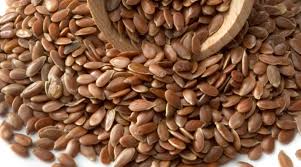Adding Flaxseed To Your Diet Helps Reduce Hypertension Study Shows

Many think that developing hypertension is just an inevitable part of growing old, but this is not true. The prevalence of hypertension does increase with age, but it is not the age that is the cause of the hypertension.[1] Aspects of the diet are responsible for the increase in hypertension as we grow older, because of the accumulated negative effects of the diet over time.
People who were eating more vegetables (ie, vegetarians) or who had low sodium intake do not exhibit any change in BP (blood pressure) with advancing age.
The consumption of flaxseed was associated with reduced risk of cardiovascular disease (including hypertension) and cancer.[2] Hypertension was the focus of the studies because having a systolic blood pressure (SBP) over 115 may be the most important factor for determining death.[1]
In the study[1] flaxseed consumption was found to to drop the SBP by 10 points and the diastolic blood pressure (DBP) by 7 points. The drop in SBP could cut the incidence of stroke by 36% and heart disease by 27%. The drop in DBP could cut stroke cut the incidence of stroke by 36% and heart disease by 29%.
The magnitude of this decrease in BP demonstrated by dietary flaxseed, therefore, is good or as better than any other nutritional intervention and comparable to many drugs.
Flaxseed was able to lower BP without any side-effects compared to pharmaceutical drugs that have cardiovascular, nervous system, gastrointestinal, psychiatric, and urinary side-effects.
Though flaxseed consumption has been shown to cut the risk of hypertension, we should avoid any avoidable risk. Eating a plant-based diet and or keeping salt intake low enough removes a great portion of the avoidable risk.
If you do supplement your diet with flaxseed you should only buy organic flaxseed because many flaxseed crops are GMO, which should be avoided.
[1]D Rodriguez-Leyva, W Weighell, A L Edel, R Lavallee, E Dibroy, R Pinneker, T G Maddaford, B Ramjiawan, M Aliani, R Guzman, G N Pierce. Potent Antihypertensive Action of Dietary Flaxseed in Hypertensive Patients. Hypertension. 2013 Dec;62(6):1081-9.
[2] M Valenzuela Melendres, J P Camou, N G Torrentera Olivera , E Alvarez Almora, D Gonzalez Mendoza, L Avendano Reyes. Response surface methodology for predicting quality characteristics of beef patties added with flaxseed and tomato paste.
[3] S Czernichow, A Zanchetti, F Tumbull, F Barzi, T Ninomiya, A P Kengne, H J Lambers Heerspink, V Perkovic, R Huxley, H Arima, A Patel, J Chalmers, M Woodward, S Macmahon, B Neal, Blood Pressure Lowering Treatment Trialists Collaboration. The effects of blood pressure reduction and of different blood pressure-lowering regimens on major cardiovascular events according to baseline blood pressure: meta-analysis of randomized trials. J Hypertens. 2011 Jan;29(1):4-16.
[4] Norvasc (amlodipine besylate) tablets label. Food and Drug Administration.
[5] T D Turner, C Mapiye, J L Aalhus, A D Beaulieu, J F Patience, R T Zilstra, M E Dugan. Flaxseed fed pork: n-3 fatty acid enrichment and contribution to dietary recommendations. Meat Sci. 2014 Jan;96(1):541-7.
[6] S Akhtar, T Ismail, M Riaz. Flaxseed – a miraculous defense against some critical maladies. Pak J Pharm Sci. 2013 Jan;26(1):199-208.
Tags: flax seed nutrition, flaxseed, what is flax seed






